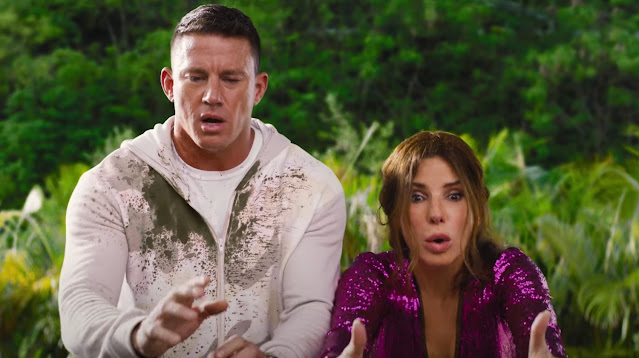Loretta Sage is a best-selling writer in the field of romance-adventure struggling to remind herself why she does what she does. Her latest writing block is a product of 1. her grieving the recent death of her husband and 2. her growing insecurity over the prestige of her career. Maybe eloquent prose is wasted on an audience that will read anything with Channing Tatum's exposed bosom on the front cover.
Loretta gets some firsthand experience in the type of romantic adventure she pens when she is kidnapped by a hungry millionaire who needs her to translate a map to an ancient treasure from her latest book (turns out that was a real treasure). Her dutiful cover model, the good-hearted but dim-witted Alan, makes it his mission to rescue her from the jungle, if nothing else to prove that he's more than just a handsome mannequin. He catches up to her quickly, and they decide they might as well find the treasure while they're in town anyway.The movie actually starts from a place of cynicism. Cynicism toward romance-adventure as a genre, cynicism toward people who read romance-adventure, cynicism toward the media that promotes romance-adventure. This is a movie where characters regularly ask things like "Why are things exploding?" Early on, the movie risks trying to be too smart for its own good. Whether Alan and Loretta find the treasure--or love--is almost incidental. The real tension with this film was whether or not the film was going to feel comfortable being itself.
The movie leans a little bit too close to irony, but it touches base with sincerity at varying points. I'll give credit where it's due: it actually manages to turn what could have easily been a hackneyed takeaway into something with buds of profundity.
The movie doesn't put a lot of thought into the structural integrity of its own narrative (Fairfax is so bent on getting his macguffin that he'll kidnap a romance novelist to get what he wants!). Neither does it particularly surprise the audience with any clever storytelling turns. This puts almost all the weight of the film on the chemistry of the performers. Graciously, the star players all show up to bat.
Bullock's strength has always been her ability to straddle awkwardness with grace, and that talent shines as bright as ever. I'll even go as far as crediting her as the biggest single element that keeps the film's climax from dipping into cliche.Channing Tatum's Alan sorts through not only his own baggage, but also all the insecurity that Loretta passes onto him as a sort of focal point of her disillusionment with her own literary work. Alan's own insecurity over him maybe not being the hero type might read more naturally if he weren't played by an A-lister like Channing Tatum. Just so, I won't deny that Tatum carries the film on his back, even when it's infested with leeches.
Daniel Radcliffe as a master villain never works as well as you want it to, in part because he never really gets to rise to the level of madness of the madcap adventure. Still, I think he's got it in him to give us Jack Lemmon's "Professor Fate" brand performance. I hope he gets that opportunity one of these days.
The film pads itself with narrative shorthand and doesn't let the audience think too deeply about its patchwork plotting, but I won't deny that its internal structure works. This is the story of a woman inundated with the flaccidity of her own commercialized existence wondering if there is real love and real adventure still to be had for her, and the film's execution is just filling enough that it doesn't have to be particularly novel. The Lost City remains a unicorn at the box office, and not just because it's the rare non-franchise film to not only play but find some success. Praising it gives it a little too much credit. Condemning it just isn't worth it.
Congratulations. You've beaten us.
--The Professor




Comments
Post a Comment